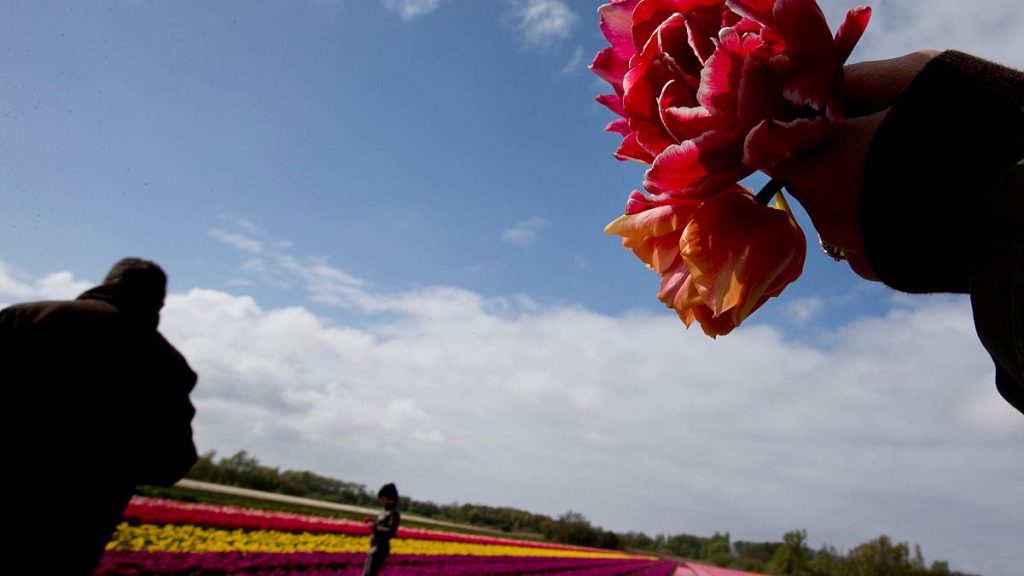The British Florist Association reveals that approximately 80% of cut flowers in the UK are imported from the Netherlands, leading to anxiety within the industry due to the implications of post-Brexit trade regulations. As of the recent changes, all fresh plant and animal products arriving in the UK from Europe must undergo disease checks at the border, including flowers. Dutch exporters of flowers and plants anticipate significant delays and potential price increases for British consumers. Previously, checks on perishable goods could be conducted at various locations near delivery addresses, but now, inspections are centralized at ports and airports, causing concern for the Dutch flower and plant sector. Leon Verschoor of Royal Lemkes expresses worry over the impact of these changes, highlighting a 5% price hike already experienced by consumers in England and predicting further increases as inspections will now be duplicated in both the Netherlands and the UK.
Royal Lemkes, a prominent exporter to the UK, supplies a variety of plants to major home furnishing retailers and DIY stores. Concerns over the extra costs and delays arising from the new post-Brexit regulations are shared by companies on both sides of the trade. RBF Cargocare, responsible for customs clearance at the port of Felixstowe, anticipates challenges from day one, including delays and increased expenses. The director, Jon Beech, warns that buyers of plants and flowers may face difficulties in procuring their desired products promptly as a result of these changes. He also confirms that prices are likely to surge due to the additional hurdles in the import process and the need for duplicated inspections. The uncertainty surrounding the future of the flower and plant trade between the UK and the Netherlands is causing apprehension and pessimism among industry participants, illustrating the negative repercussions of Brexit-related trade policies on the sector.
The shift towards centralized inspection points at ports and airports is seen as a significant obstacle for the Dutch flower and plant exporters as it adds another layer of checks and potential delays to the supply chain. This change contrasts with the previous system of inspections being conducted closer to delivery addresses, allowing for more efficient processes. The concerns raised by industry insiders suggest that the new regulations are likely to result in logistical challenges and cost implications for businesses involved in the trade of perishable goods between the UK and the EU. The repercussions of Brexit on the flower and plant sector are becoming increasingly evident, with price increases and supply chain disruptions expected to impact both suppliers and consumers in the near future.
The complex nature of the import process for plants and flowers following Brexit has raised doubts about the feasibility and sustainability of the trade relationship between the UK and the Netherlands. The reliance on Dutch exporters for the majority of cut flowers in the UK underscores the interconnectedness of the two markets and the potential repercussions of trade barriers on the flower and plant industry. The responses from industry experts and stakeholders reflect a sense of unease and uncertainty regarding the future of the trade relationship post-Brexit, with fears of increased costs and logistical challenges looming large. As companies grapple with the practical implications of the new regulations, concerns about supply chain disruptions and price hikes are becoming more pronounced, highlighting the need for effective solutions to navigate the evolving landscape of international trade in the wake of Brexit.
As exporters and importers adapt to the changes in post-Brexit trade rules, the flower and plant sector faces the daunting task of restructuring supply chains and optimizing operations to mitigate the impact of increased inspections and delays. The logistical challenges posed by the centralized inspection system at ports and airports necessitate innovative solutions and strategic partnerships to ensure seamless trade flows between the UK and the Netherlands. Stakeholders in the industry are exploring ways to streamline processes, reduce costs, and enhance efficiency in response to the evolving regulatory environment post-Brexit. Collaboration between businesses, government agencies, and industry associations is essential to address the challenges posed by the new trade regulations and safeguard the future viability of the flower and plant trade between the UK and the Netherlands.
Ultimately, the uncertainty and disruptions caused by post-Brexit trade rules on the flower and plant sector highlight the need for proactive measures to mitigate the adverse effects on businesses and consumers. The challenges of increased inspections, delays, and rising costs underscore the complexity of international trade relations in a post-Brexit landscape and emphasize the importance of adaptive strategies and agile responses to navigate the evolving regulatory environment. As the UK and the Netherlands navigate the implications of Brexit on the flower and plant trade, collaboration, innovation, and resilience will be crucial in ensuring the continuity and sustainability of the industry in the face of new regulatory hurdles and logistical complexities. By addressing the challenges posed by Brexit-related trade policies through strategic initiatives and industry cooperation, stakeholders in the flower and plant sector can work towards sustaining a thriving trade relationship between the UK and the Netherlands in a post-Brexit era characterized by uncertainty and change.


